| Reviews & Columns |
|
Reviews DVD TV on DVD Blu-ray 4K UHD International DVDs In Theaters Reviews by Studio Video Games Features Collector Series DVDs Easter Egg Database Interviews DVD Talk Radio Feature Articles Columns Anime Talk DVD Savant Horror DVDs The M.O.D. Squad Art House HD Talk Silent DVD
|
DVD Talk Forum |
|
|
| Resources |
|
DVD Price Search Customer Service #'s RCE Info Links |
|
Columns
|
|
|
Rose of Versailles, Part 1: Limited Edition, The
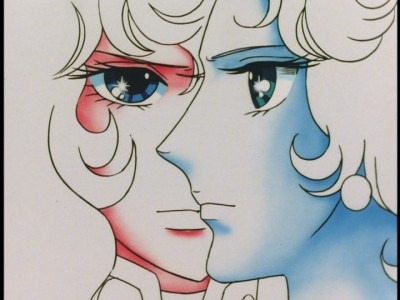
The Rose of Versailles is one of the greatest successes in shōjo manga ever created, and with the success of said manga (which debuted in 1972 and only ran one year until 1973), the storyline was later adapted into an anime series in 1979-1980 for Animax and Nippon television. The basic concept of the story was to craft a storyline focused around the French Revolution in animated form, focusing in on both the before and after of the events of this historic event; simultaneously telling a romantic story of fictional leading character Lady Oscar and her love Andre, while bringing historical figures like Marie Antoinette into the fold of the storytelling. Finally released in America by RightStuf's anime label Nozomi Entertainment, the show has been released in sequence with two DVD box-set's presenting the anime series.
The story begins with General de Jarjeyes having a meltdown upon realizing that his pregnant wife gave birth to a daughter instead of a son. Outraged at God, he believes that he should be able to have a son one way or another, so he decides to raise his daughter as a son instead of allowing her to grow up as a woman. Thus the story of Lady Oscar begins. She is raised in a manner where she is to be masculine in appearance and given the title of Commander of the Royal Guard when she is old enough. This doesn't, of course, change the fact that she is not actually a boy but her angry, vile father insists on raising her this way, and it leads Oscar to living a life of some confusion and internal conflict, especially when it comes down to her romantic feelings for a soldier which grows over the course of the show.
The animation on the show is rather impressive for the time period. Some of the absolute best animators of the time were working on the production, and sometimes the series is simply an immense marvel to look at visually. At other times, the opposite effect can happen though as many moments are slowly laid out through "snapshot" like frames of animation, which adds something unique to the visual aspect of the show but it also sometimes seems like it's just a shortcut to making the show a bit easier to produce. (For what it's worth, this feeling was in essence confirmed during a interview with director Osamu Dezaki included with the extras packaged alongside the second DVD set).
It is also a curiosity piece of a series because it's a series surrounding the French revolution. No doubt, some anime fans will want to tune in to experience an animated telling of some of these events. Just remember to keep in mind that some of these moments have been changed to less historically accurate elements. However, this series still manages to keep a lot of dates intact; preserving some historical accuracy and also some of the core concepts of the revolution. It doesn't completely fail as a history piece, but just don't watch it expecting total accuracy as something that could ever replace learning about the events separately. The series is also a romantic show with a lot of "made-up" elements that has everything to do with the writers creating the show -- that includes the series main protagonist and a lot of other elements in fictional storytelling.
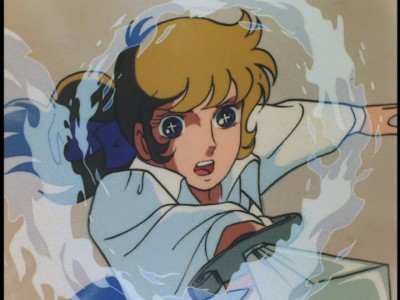
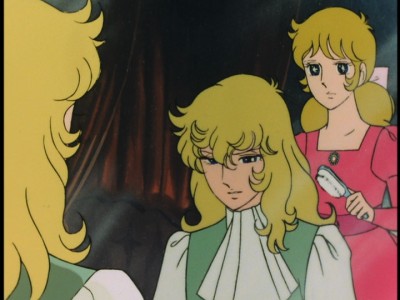
One of the things that makes the show stand out is the abundance of romanticized moments. Characters are frequently highlighted with animation to make them appear more romantic in nature and one of the most common things to happen on the show is to have sparkles used to emphasize different moments. This happens when characters are romantically embracing and surprisingly during other (less expected) moments, such as during some of the battle moments, during horse rides across the land, and other strange moments to focus on the sparkling element. Perhaps this is exactly what fans of shōjo anime want, but it feels over-the-top in a way that is a bit limiting on the series full potential; given the subject matter utilized. Nonetheless, it's clearly not on the creators minds.
I'm a fan of romantic anime series and shōjo work can be exceptional. I've never read the manga series though, and the anime version doesn't necessarily succeed in quite the way I hoped given how popular this show was in Japan. This certainly will appeal to a certain audience, but it is a creation that won't appeal as much to those who don't care for mostly melodramatic storytelling.
Unfortunately, I also found the show to be a bit boring in parts, and this is neither to do with the storyline or the concept: the animation and directing has moments where the beautiful quality of the work is well emphasized but it also slows down so much at times that the characters seem to actually be doing just about nothing and at a slow pace. There are really just far too many shots of the sky -- or birds flying -- or wind blowing, and all sorts of other unnecessarily emphasized elements which seems to be emphasized by both of the series directors, Tadao Nagahama and Osamu Dezaki. It's a bit irritating.
North American fans of Shōjo anime productions have no doubt heard a little bit about anime's earliest effort in the genre, The Rose of Versailles, before reading this review -- as often as it is discussed as being shōjo anime's start point. The series is definitely something that will appeal specifically towards fans of the genre the most. The series is abundantly over-the-top at times with characters breaking away during a number of scenes to say something for the audience (these moments are too brief to call monologues) and characters frequently repeat dialogue, especially when in regards towards romance and moments of life or death circumstances. It makes the series feel more melodramatic and soap-opera-y than historical and dramatic. It's disappointing because the show can make the distinction of being not only the beginning of shōjo anime but it is also one of the few historically based anime series of it's time-period; a distinction which remains relevant today.
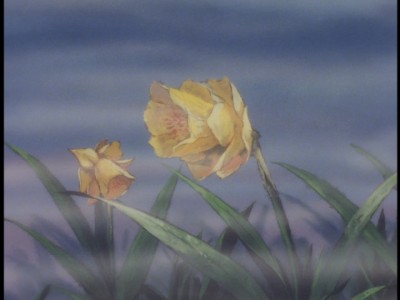
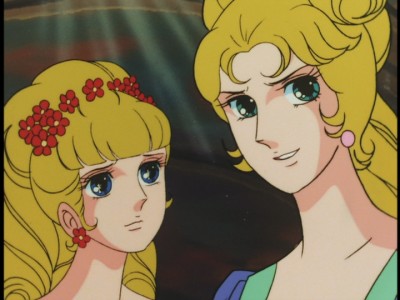
The Set (Part 1: Episodes 1-20):
The first twenty episodes of the series are included on RightStuf's first release of The Rose of Versailles. These are the introductory episodes of the show, and most of the characters were being established in these early on episodes. The main element of the show's start was to be effective in introducing the central character Lady Oscar, who becomes a leader within the French Royal Guard, and who is also an excellently skilled duelist. One of her first major appointments is to protect Marie Antoinette, who she soon realizes a lot of people want destroyed through her reputation -- she even begins to recognize that she has to protect Antoinette from potential death and the risks in her protection begin to mount further.
These early episodes are amongst the weakest of the show's entire run: this is partly because everything seems a bit rushed as far as the production is concerned, but it is also as the main director, Tadao Nagahama, was one of the weakest elements of the show's early creation: it seemed as though his direction lacked much enthusiasm or understanding of the storytelling. Unfortunately, this set's the show's beginning half up in a disappointing manner and he was leaving the show before it even hit twenty episodes total, which eventually caused the staff writers and production team to put together several episodes without a replacement director helming the show for a few episodes time (during which time the producers were still going forward with finding the show a director to replace Nagahama).
The series begins on a weaker note creatively, but it does have some occasionally interesting moments and it is clearly the beginning period of an artistically different style of television program that would play on some new differences in anime's creative world of possibilities. Beginning The Rose of Versailles was the initial forward momentum needed for the Shōjo productions like it to begin to be seen by the industry as successful shows; and that is the significant element of most historical importance from these early episodes of the show.
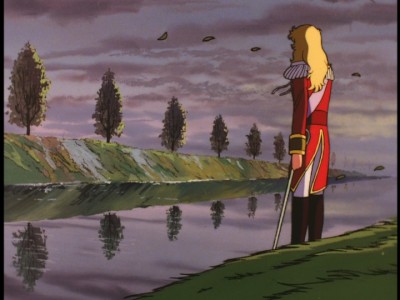
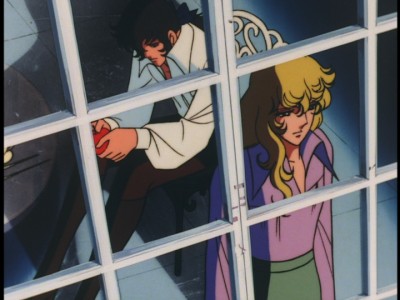
The DVD:
Video:
The Rose of Versailles is presented on DVD by RightStuf/Nozomi with surprisingly good transfers that suggests some restoration work was likely done, because colors and artwork throughout the show suggest a surprisingly clean and efficient presentation. There are still occasional moments where specks of dirt or remarkably minor print damage is visible; it's mainly consistently impressive though, and the show looks remarkably detailed and crisp considering the standard definition presentation. The impressive animation is beautiful to appreciate with these notable and enjoyable episode transfers, which are retained with the original aspect ratio of 1.33:1 full-frame.
Audio:
The 1.0 mono audio included on these episodes isn't anything particularly special to behold. However, it's the original audio that the series was created with, and for its age it sounds as remarkably clean, crisp, and audible as one can expect: dialogue is easy to understand and properly follow (which is the most important aspect) and while overall fidelity is generally average at best, the vocal clarity is good enough for viewing the show.
Extras:
The only supplements included on the first Rose of Versailles collection are clean opening and closing animations.
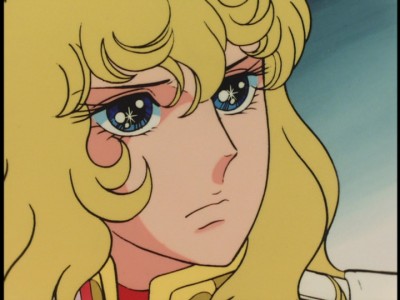
Final Thoughts:
The Rose of Versailles is an ambitious and groundbreaking anime production which was in fact, essentially speaking, the founding blueprint utilized for the later success of many more Shōjo anime productions, which have become one of the most essential areas of anime as a whole. Anime fans will no doubt want to check the show out for its historical relevance, and while nothing about the show is as good as more modern productions beyond the animation style, something about a classic anime creation with romance and a historical backdrop intrigues.
Nozomi's quality PQ/AQ presentation and a beautiful chipboard art-box makes this a fancy collector's set that fans will want to purchase the set, while newcomers should start with an introductory rental to see if the show is worth adding to their collections.
Rent It.
Neil Lumbard is a lifelong fan of cinema. He aspires to make movies and has written two screenplays on spec. He loves writing, and currently does in Texas.
|
| Popular Reviews |
| Sponsored Links |
|
|
| Sponsored Links |
|
|
| Release List | Reviews | Shop | Newsletter | Forum | DVD Giveaways | Blu-Ray | Advertise |
|
Copyright 2024 DVDTalk.com All Rights Reserved. Legal Info, Privacy Policy, Terms of Use,
Manage Preferences,
Your Privacy Choices | |||||||














